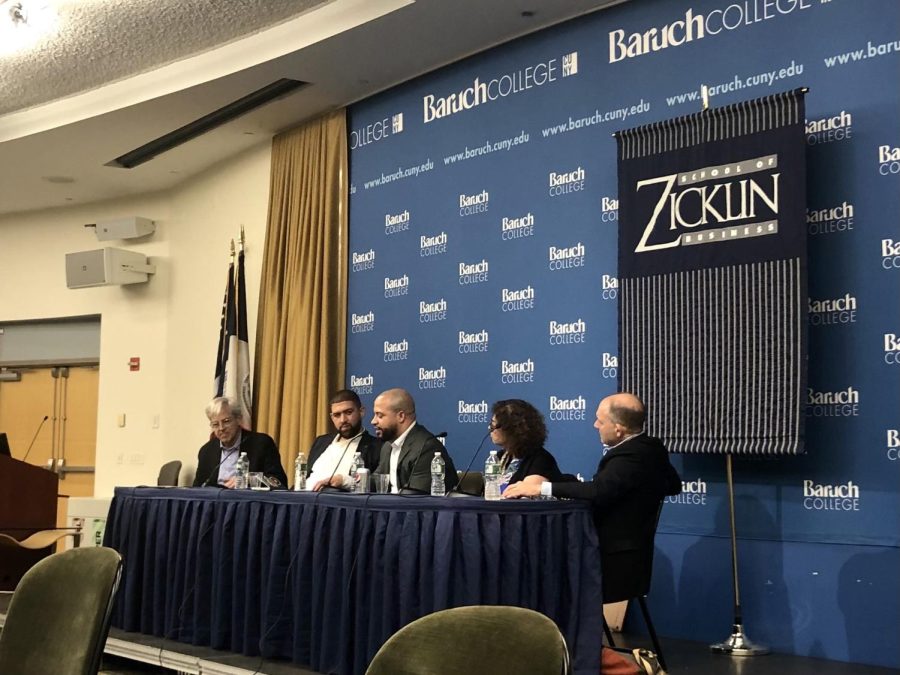Zicklin Center facilitates discussion on ethics of retail cannabis industry
May 8, 2023
The Robert Zicklin Center for Corporate Integrity facilitated a discussion about New York’s retail cannabis industry in a panel on April 27.
Titled “Legal Recreational Marijuana in the Empire State: Ethical and Practical Implications,” the panel was moderated by David Rosenberg, who is the director of the Zicklin Center and law professor at the Larry Zicklin School of Business. He said he was glad that this event discussed recreational marijuana as “a commodity, not contraband.”
Former New York Gov. Andrew Cuomo signed the Marijuana Regulation and Taxation Act into law on March 31, 2021, legalizing the consumption of marijuana for recreational purposes and the sale of the substance at authorized retailers. The first licensed business opened in New York City in December 2022.
“Much of the tax revenue for sales will be used to invest in precisely those people who suffered from decades of law enforcement that disproportionately targeted Black and Latino communities,” Rosenberg explained. “Further, licenses are being granted with a priority for those with past convictions. I just state my opinion that, from a policy perspective, this is progress.”
The event was facilitated with the intention of addressing issues, such as the ethical challenges faced by first-time marijuana retailers, the role these people should have in helping those who were affected by New York’s former anti-cannabis laws and the allocation of revenue generated from marijuana sales.
The Zicklin Center director was joined by Jesse Campoamor, the CEO and founder of the consulting firm Campoamor and Sons; Vladimir Bautista, the co-founder of the cannabis lifestyle brand Happy Munkey; Jonathan Engel, a professor from the Marxe School of Public and International Affairs; and Elizabeth Kase, the co-chair the cannabis law practice group of the firm Ruskin Moscou Faltischek.
Campoamor worked with stakeholders and senior members of the governor’s team to get legislation on medical marijuana use “over the finish line.”
To incentivize people to come into the retail cannabis market, Campoamor said the state created a $200 million fund to provide access to capital.
While the state is prioritizing individuals impacted by the “war on drugs” policy, he acknowledged the nonsocial equity groups and businesses that are waiting to enter the market but shared that he thinks “the most healthy market finds a marriage between corporations and legacy operators — folks who had the longest history with the plan.”
“If you guys consume, if you travel anywhere in the world and meet somebody else that consumes, there’s something that immediately bonds you guys together,” Campoamor said. “You can’t necessarily describe it with words, but there’s this culture you guys are a part of.”
Raised in Harlem and the son of Dominican immigrants, Bautista said he has consumed cannabis for 27 years and has sold it for 25 years. He talked about his journey to the legacy market that Campoamor had described.
“At the time, I didn’t know it, but as we know now, it definitely helps with mental health and dealing with stressful situations,” he said. “At 16, I started using it as a means to be able to maintain myself and feed myself.”
Bautista added that if it weren’t for cannabis, he “wouldn’t be here today because the other options to feed” himself could have put him in jail or killed him. With business partner Ramon Reyes, they advocated to make recreational marijuana possible in the state.
Working as an adult-use cannabis lawyer, Kase is familiar with law in the corporate, real estate law, employment, health care and regulatory industries. She works with clients to obtain licenses to sell marijuana.
Although an advocate for reform and integrating small businesses into the retail marijuana industry, she is also aware of the potential “dogfights” with conservative groups against cannabis retail locations.
“There’s this intersectionality of we know the right thing is coming,” Kase said. “It’s been started, it’s been blessed and it’s been voted and approved, but it hasn’t really flourished yet, and a lot of people are extraordinarily frustrated by that, from a business point of view and a social point of view.”
Discussing nationwide efforts to legalize marijuana, Engel raised the concern of children consuming the substance. He recalled efforts by tobacco corporations to increase their margins by getting consumers into the product at a young age with advertising mascots like “Joe Camel.”
“I think legalization is a good thing,” Engel emphasized. “The cost of having marijuana illegal was very high and unnecessary, but we should be concerned about some of the harm we are inviting as we legalize this. We should try to plan for some at-risk consequences and think long and hard about how we’re going to educate young people and prevent them at too young an age.”









Brian Kelly • May 9, 2023 at 3:00 am
Cannabis consumers in all states deserve and demand equal rights and protections under our laws that are currently afforded to the drinkers of far more dangerous and deadly, yet perfectly legal, widely accepted, endlessly advertised and even glorified as an All-American pastime, alcohol.
Plain and simple!
Legalize Nationwide Federally Now!
Fear of Cannabis Legalization Nationwide is unfounded. Not based on any science or fact whatsoever. So please prohibitionists, we beg you to give your scare tactics, “Conspiracy Theories” and “Doomsday Scenarios” over the inevitable Legalization of Cannabis Nationwide a rest. Nobody is buying them anymore these days. Okay?
Furthermore, if all prohibitionists get when they look into that nice, big and shiny crystal ball of theirs, while wondering about the future of cannabis legalization, is horror, doom, and despair, well then I suggest they return that thing as quickly as possible and reclaim the money they shelled out for it, since it’s obviously defective.
Regarding “The Children”,
Let’s not use “The Children” as an excuse to prohibit and criminalize adult use of a natural plant far less dangerous than perfectly legal alcohol because nobody condones child use, and this is about allowing adults only to choose cannabis.
It’s our responsibility as parents by to educate our children on drug use. It’s not the government’s job to force Draconian cannabis Laws upon every adult citizen under the guise of protecting “The Children”.
What message are we sending our children when it is easier for them to obtain cannabis now with it being illegal than it is for them to buy alcohol?
It doesn’t take the intellect of a genius to understand that stores card kids for I.D. Thugs and gang members do not. They also push the real hard drugs on children. Stores do not.
Cannabis legalization will make it harder for children to obtain it.
What message does it send our children when several of the Presidents of The United States themselves alongside a long list of successful people openly admit regular pot use at one time or another in their lives?
While we tell our kids how it will ruin their futures, and then ensure so, by allowing our government to to jail our children and give them permanent criminal records when they get caught with a little cannabis. Especially, if they are the wrong skin color or from the “wrong neighborhood”. Which in turn, ruins their chances of employment for life.
The Prohibition of cannabis is the wrong message to send our children while we glorify, advertise and promote the much more dangerous use of alcohol like it’s an all American pastime.
The worst thing about cannabis and our children is what happens to them when they get caught up in the criminal justice system due to it’s prohibition.
Protect “The Children” and Our Neighborhoods Through The Legalization and Regulation of Cannabis Nationwide!